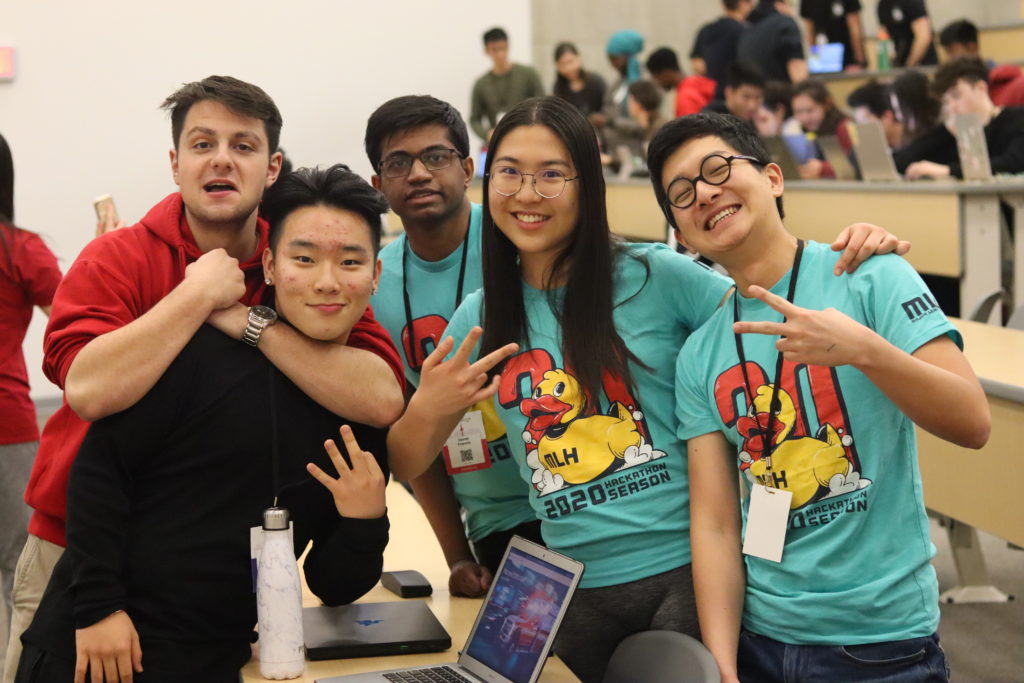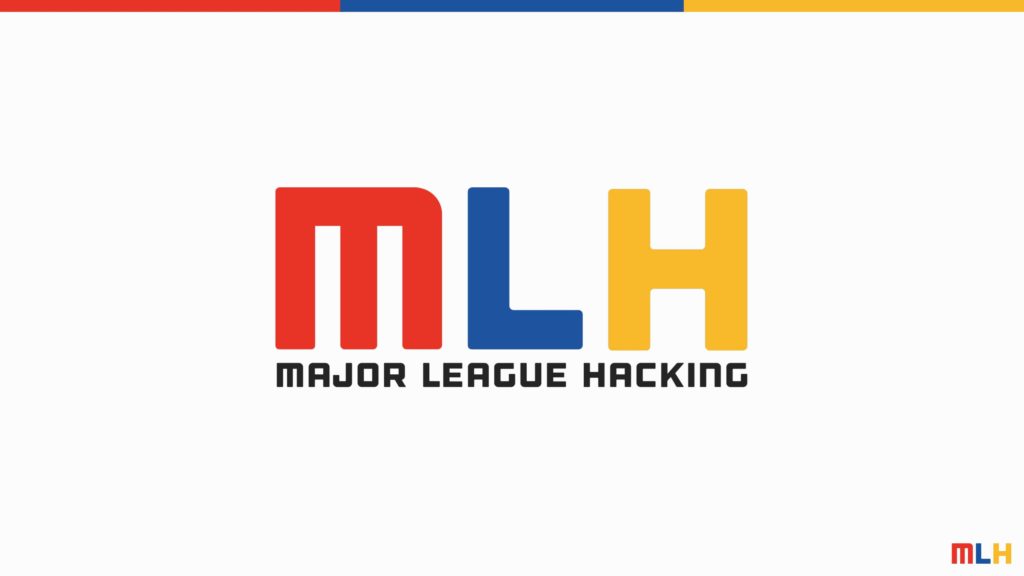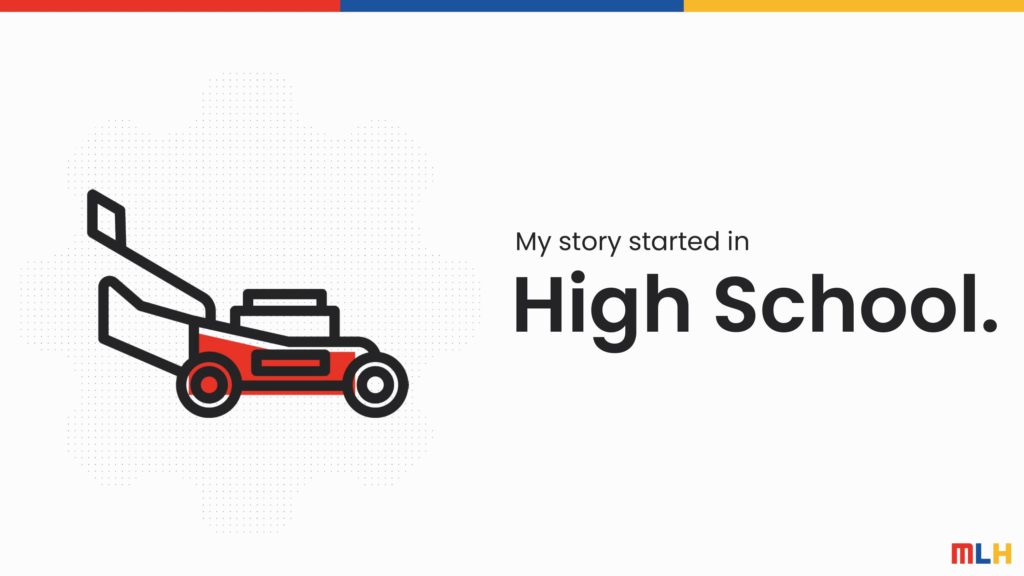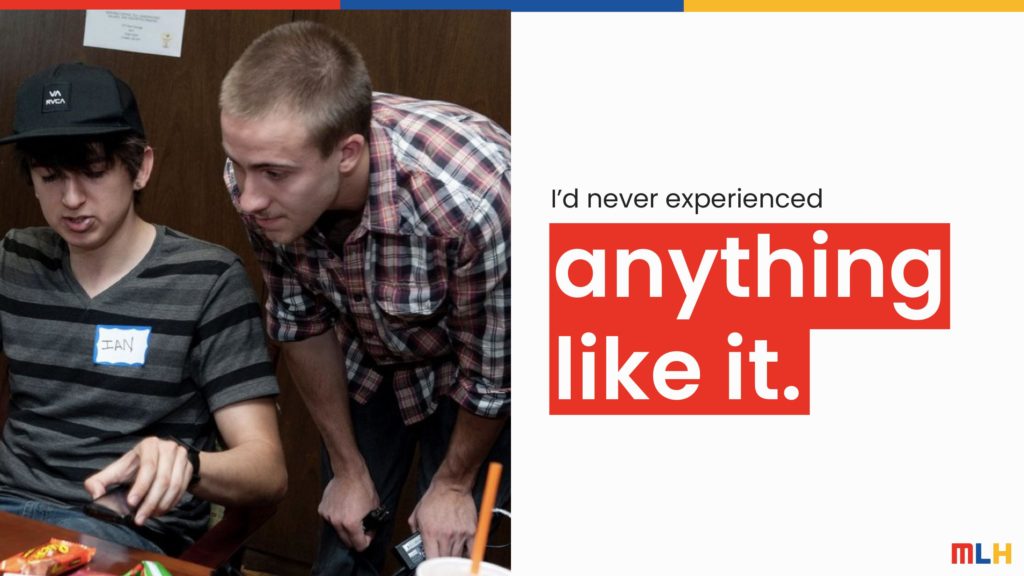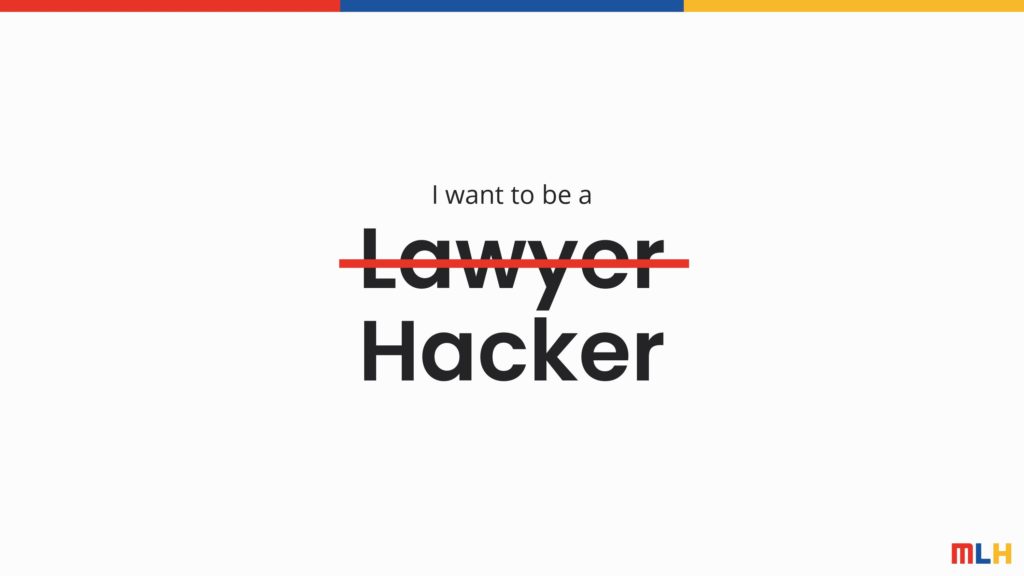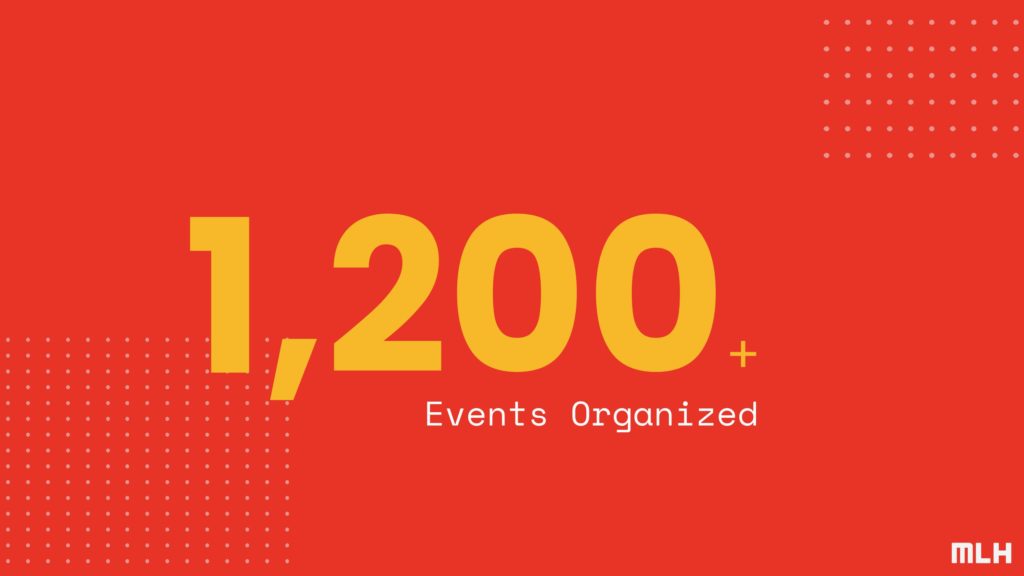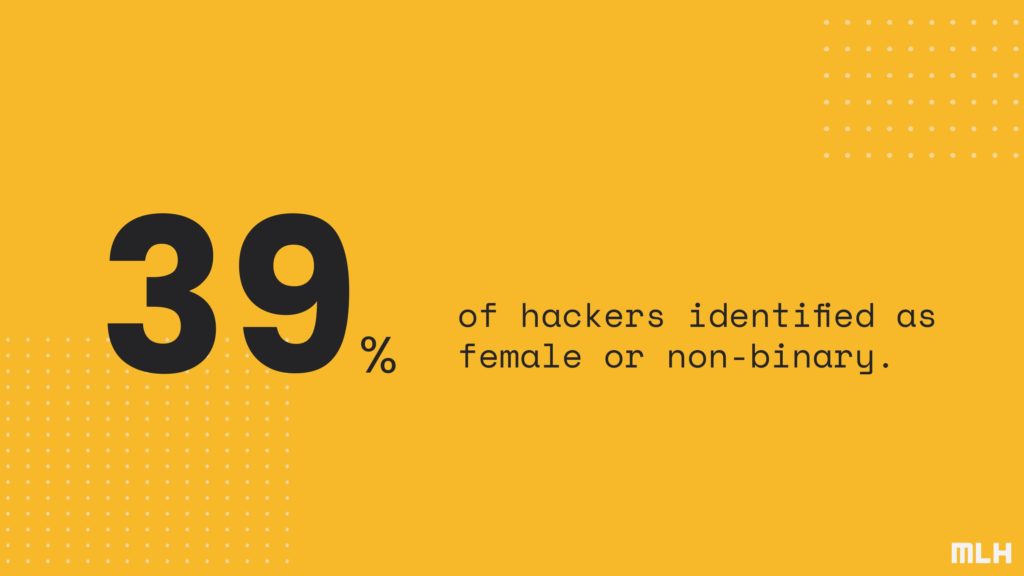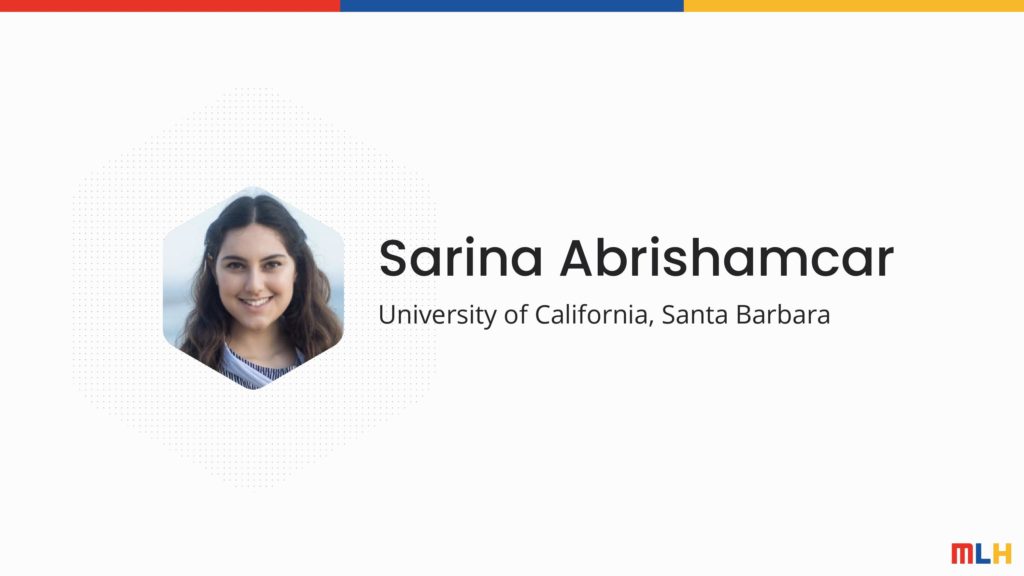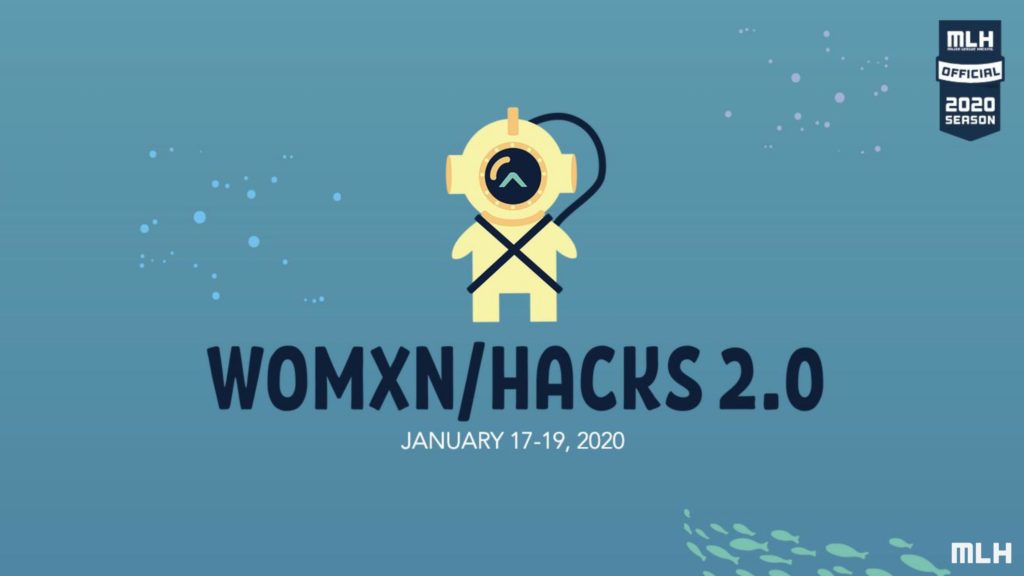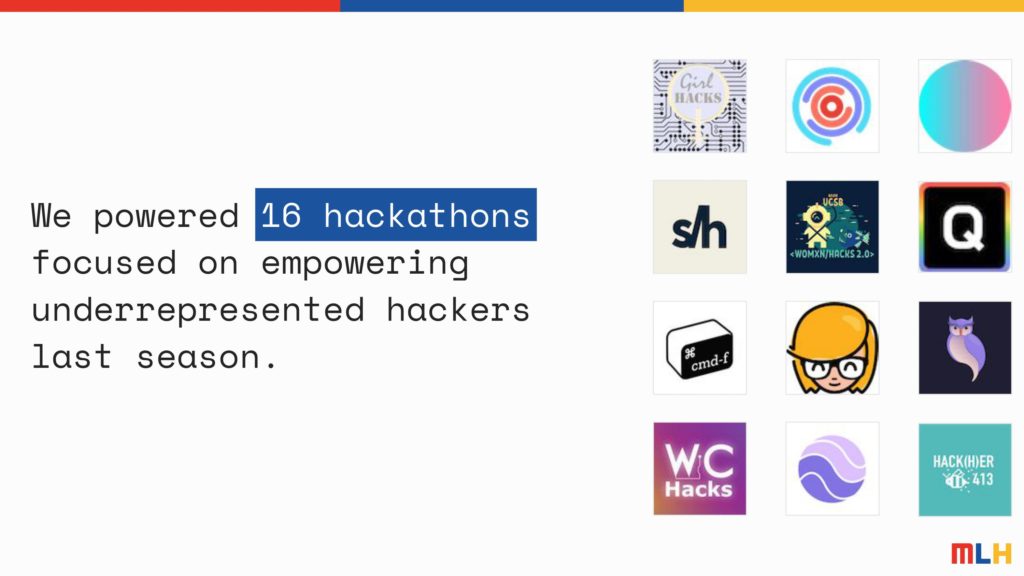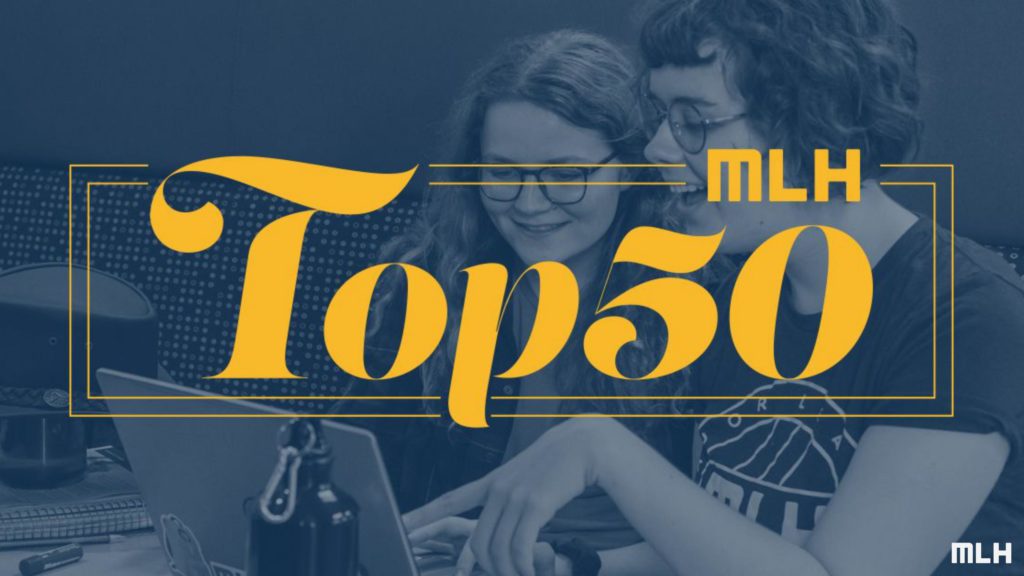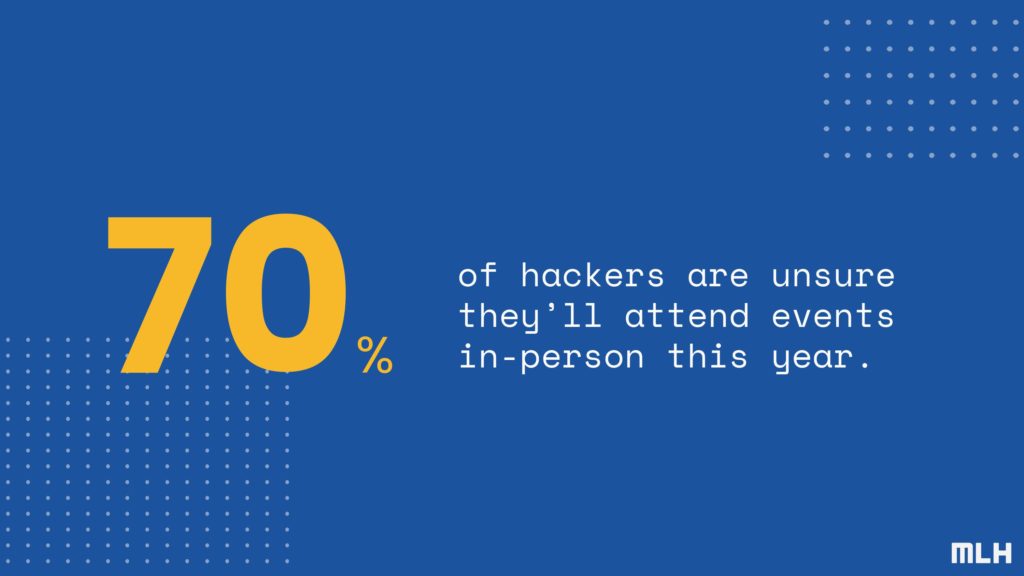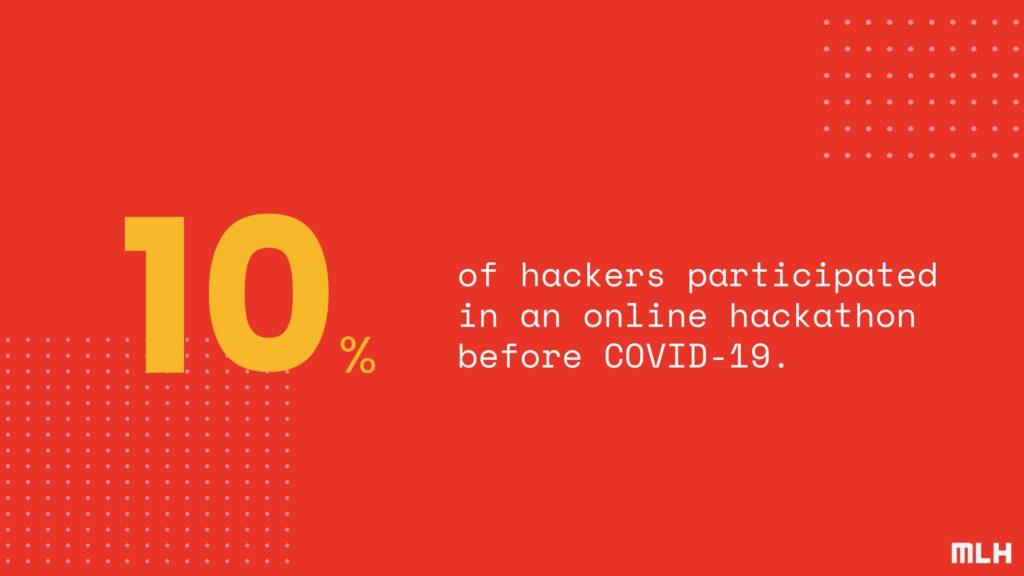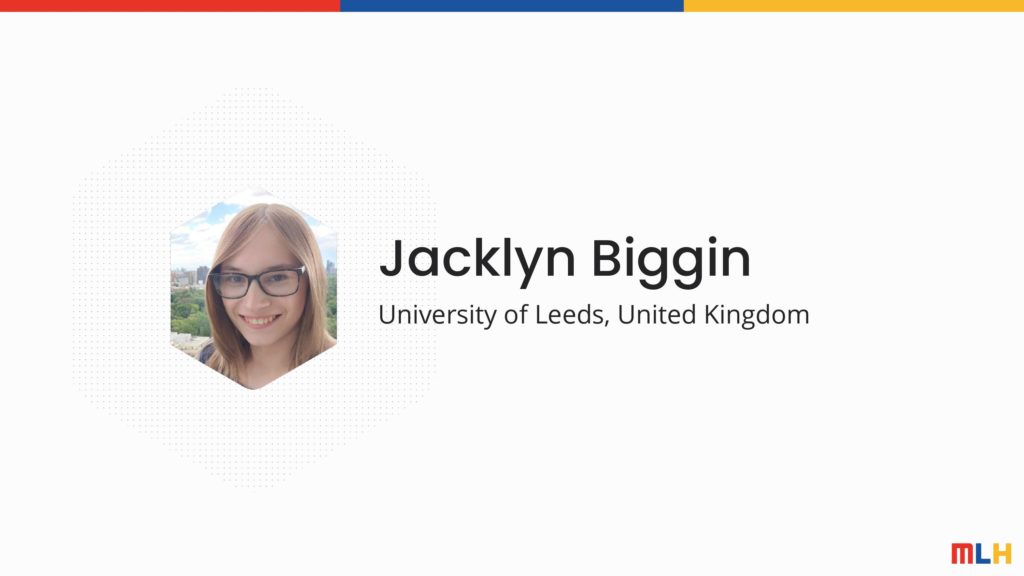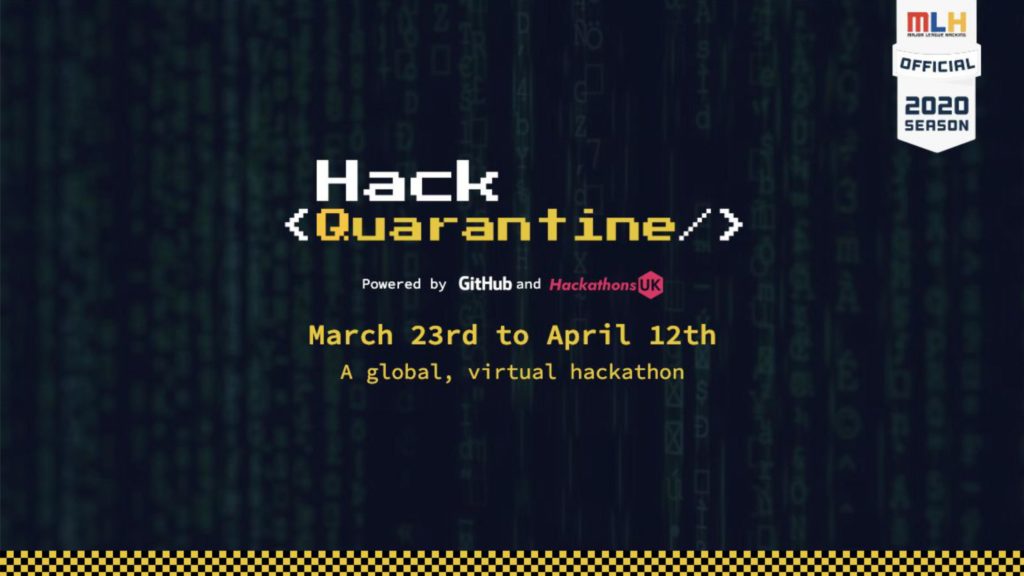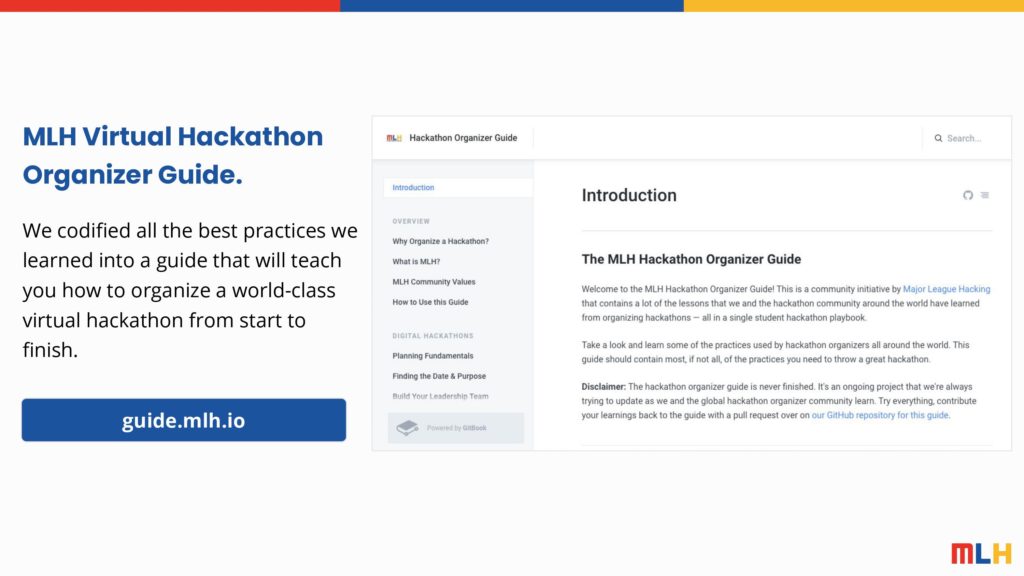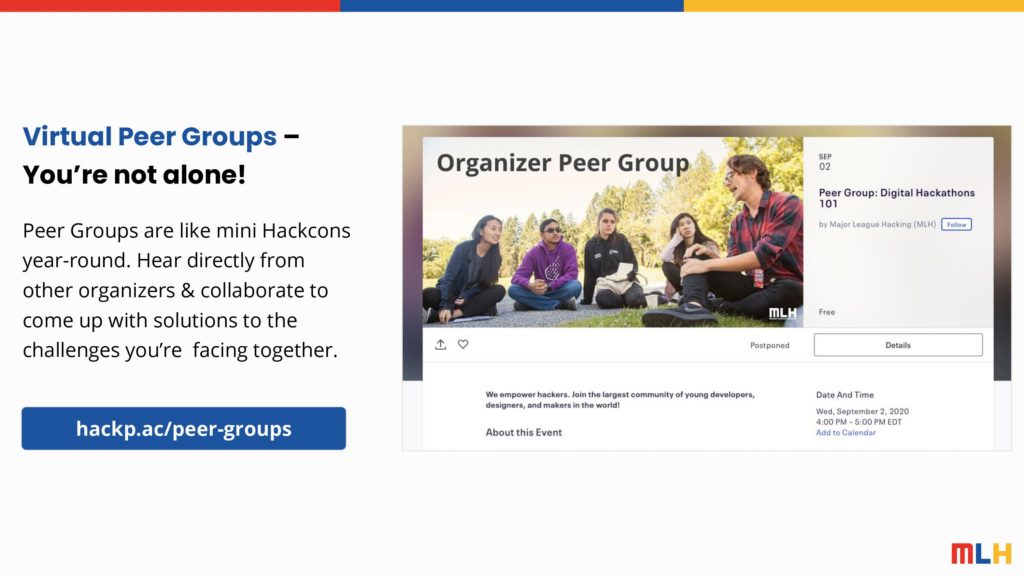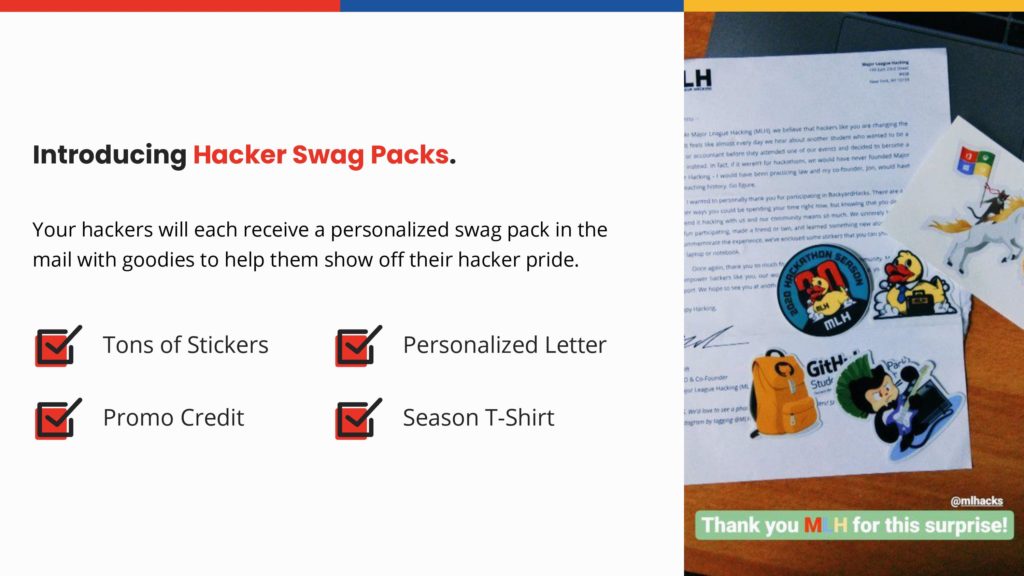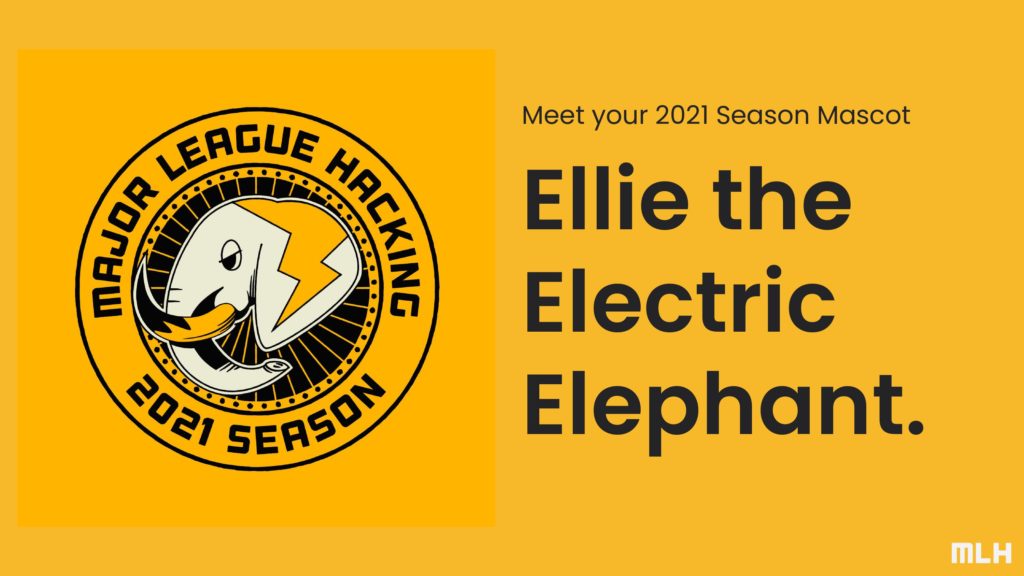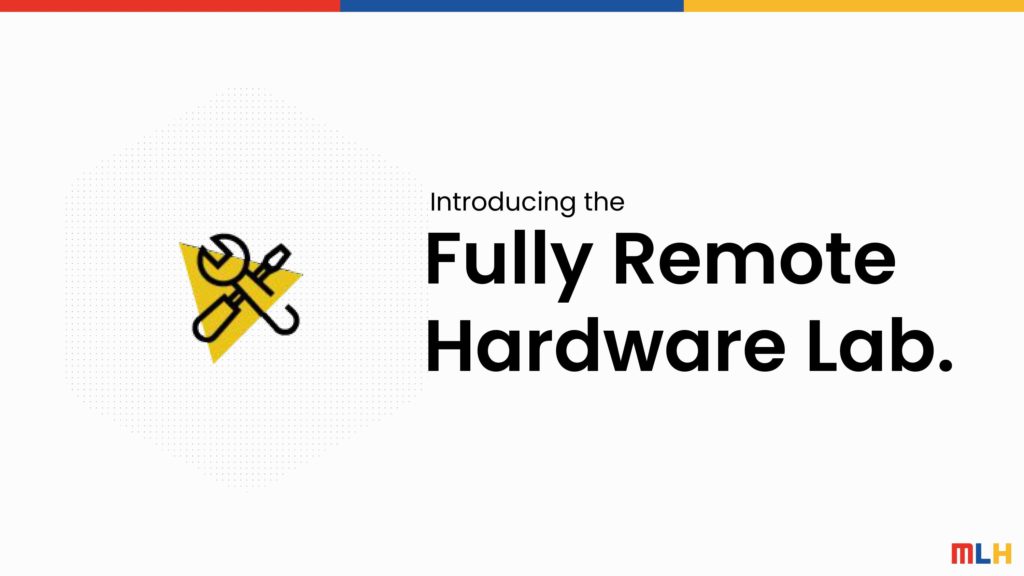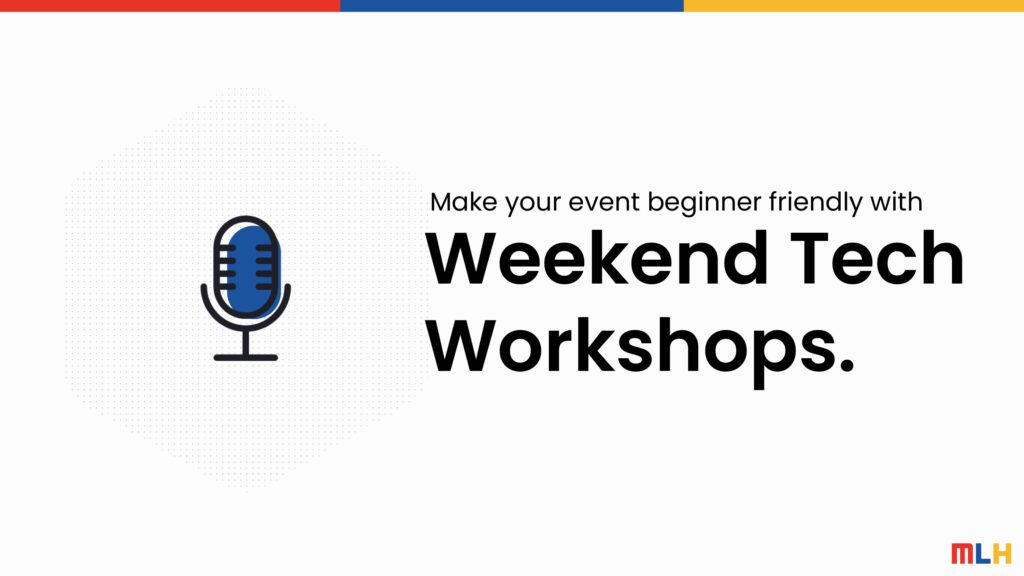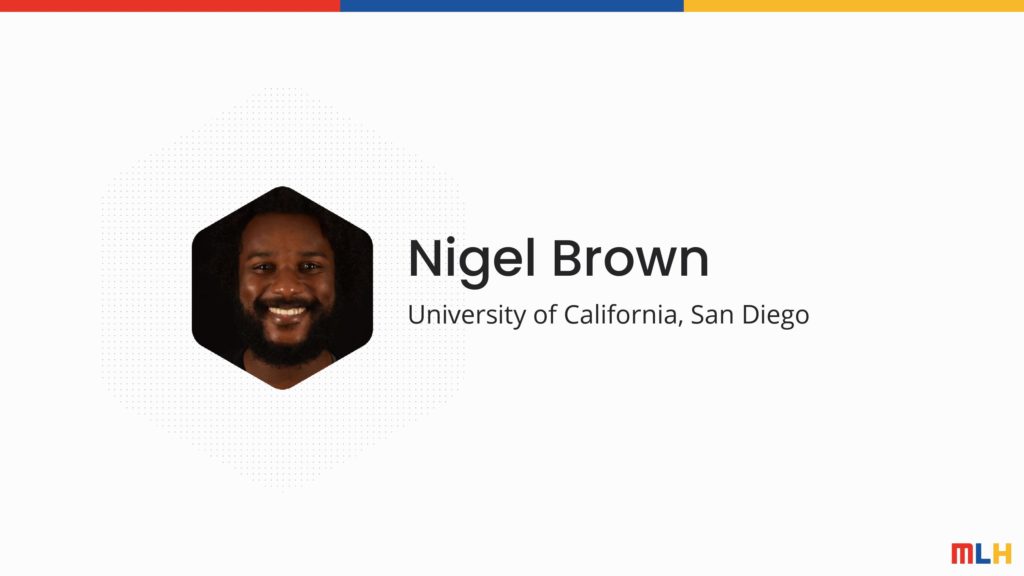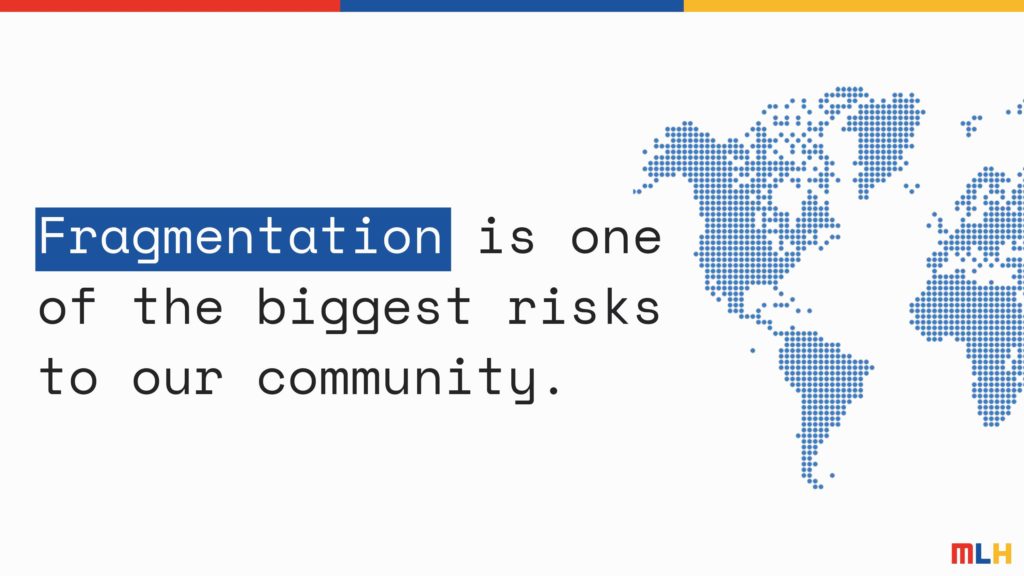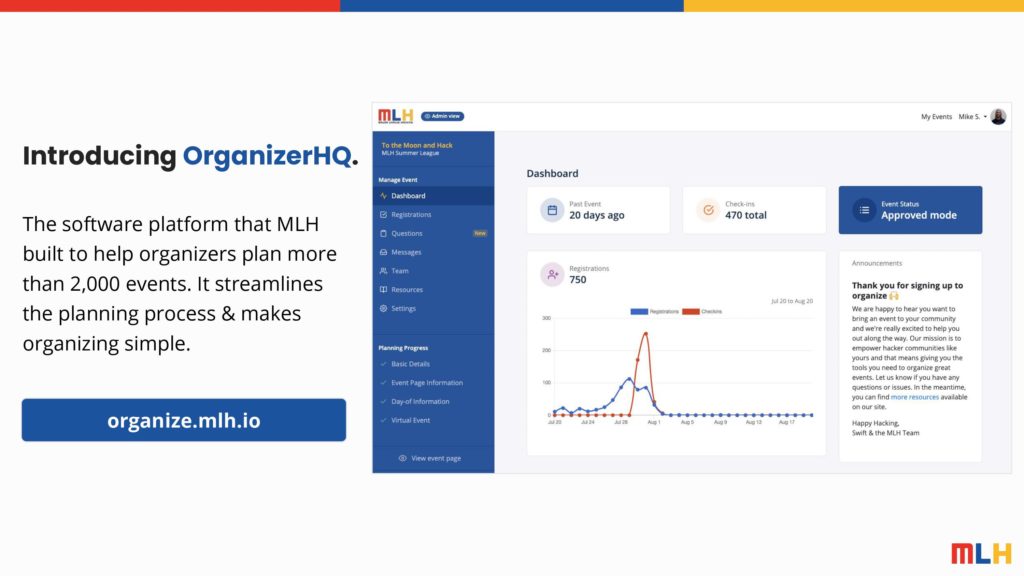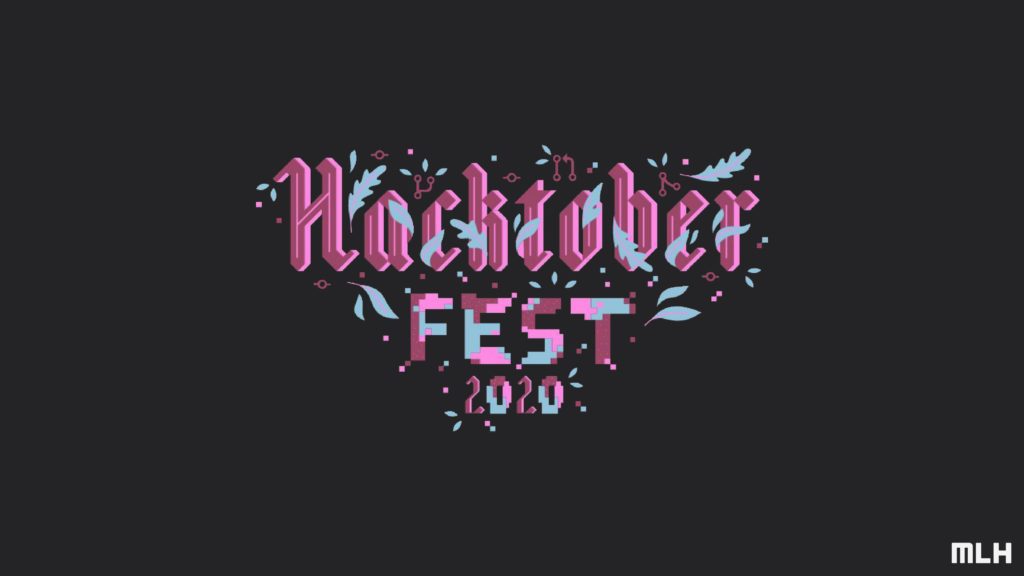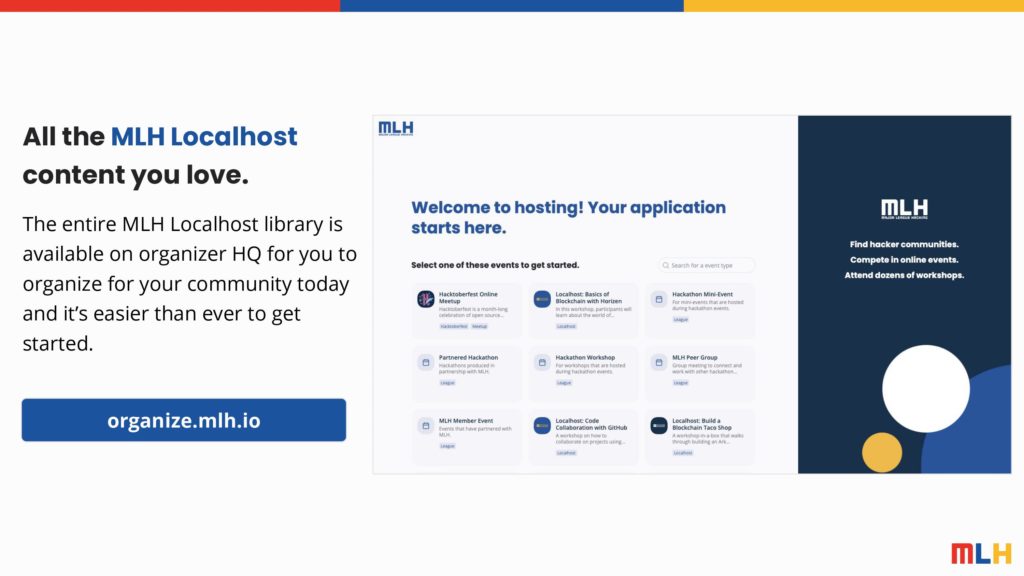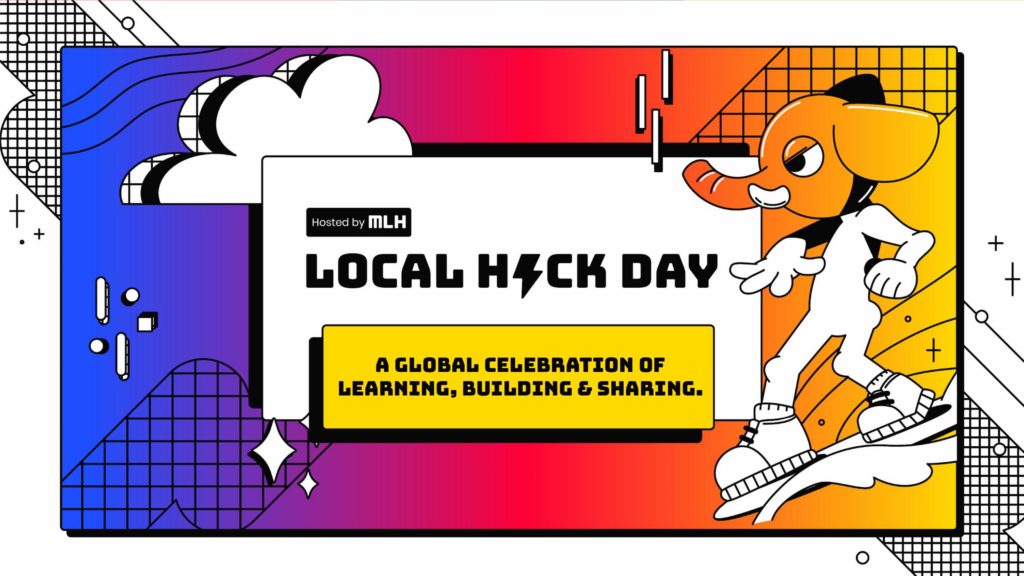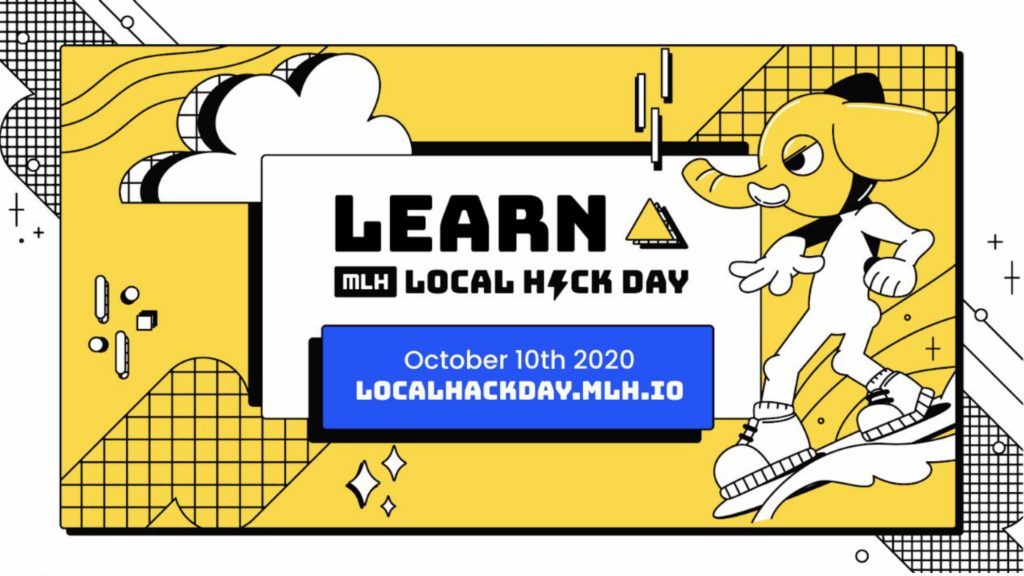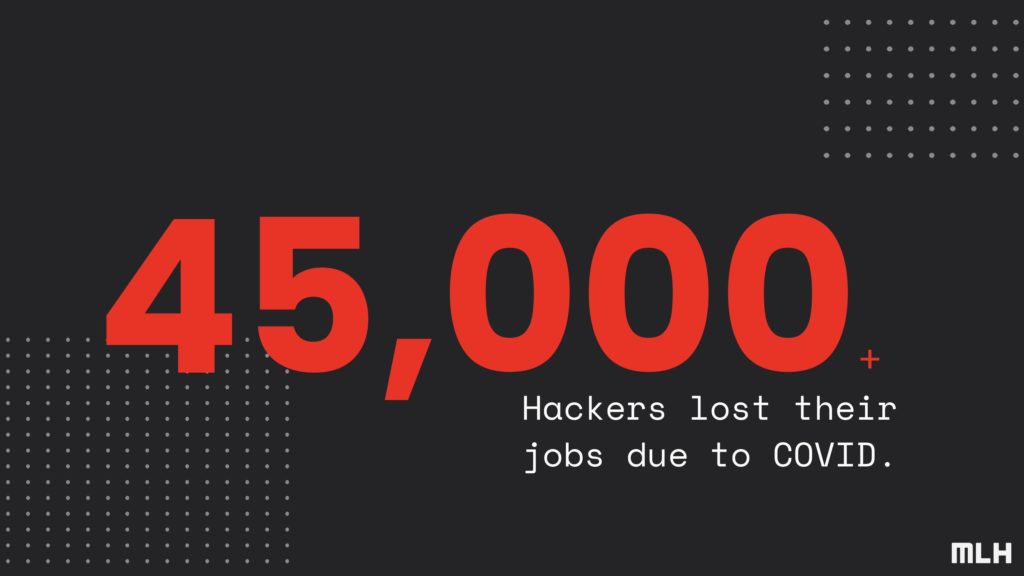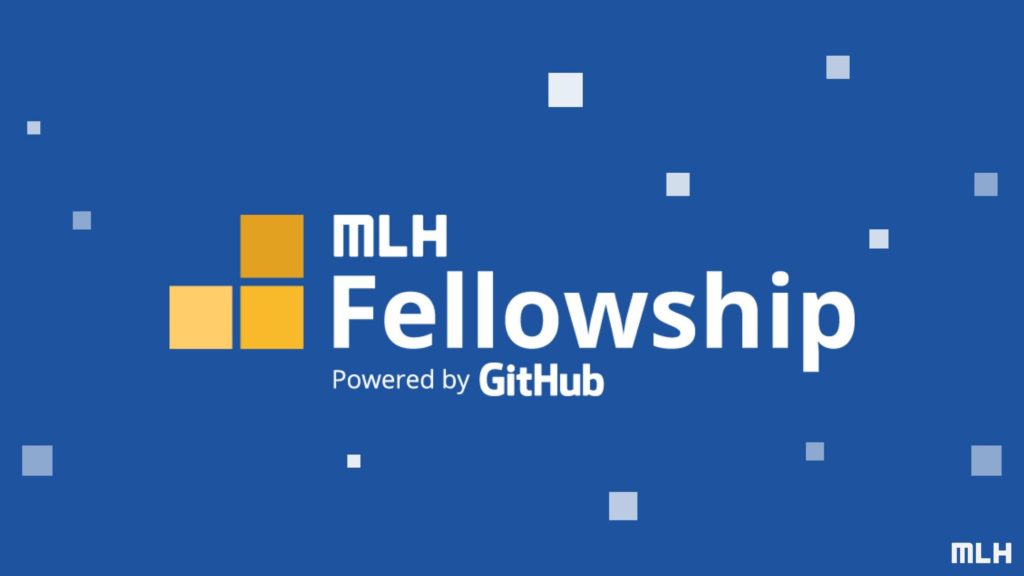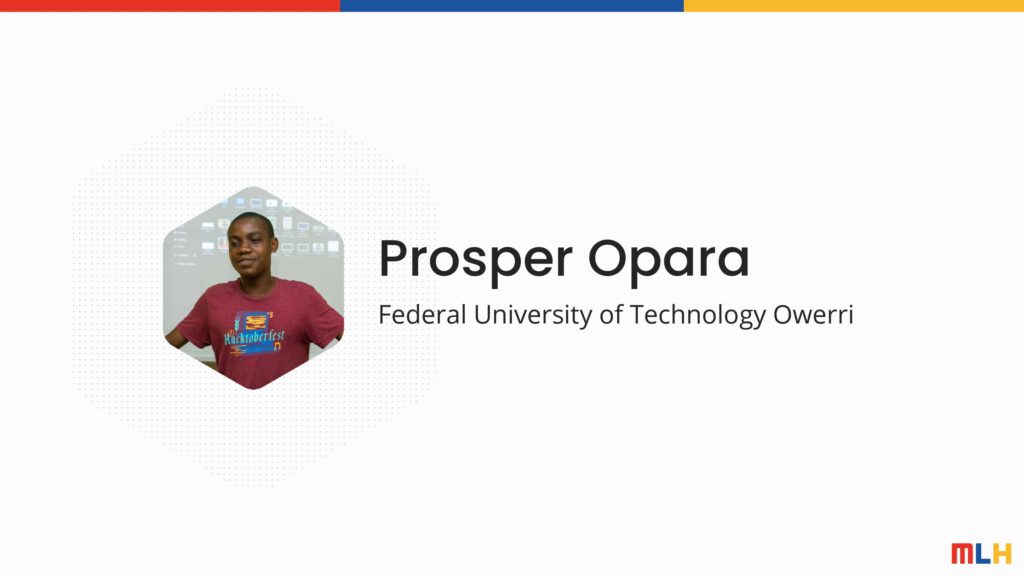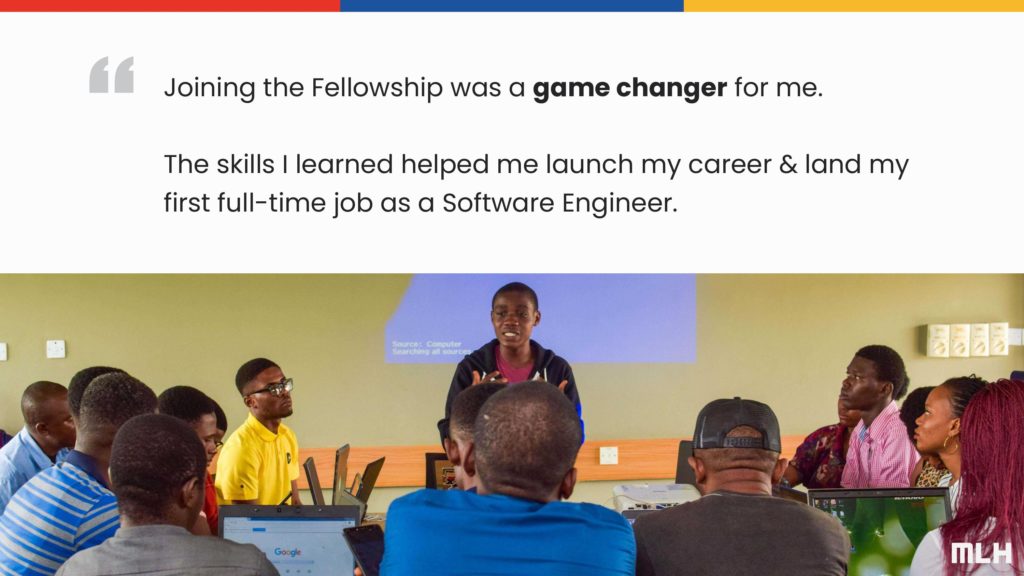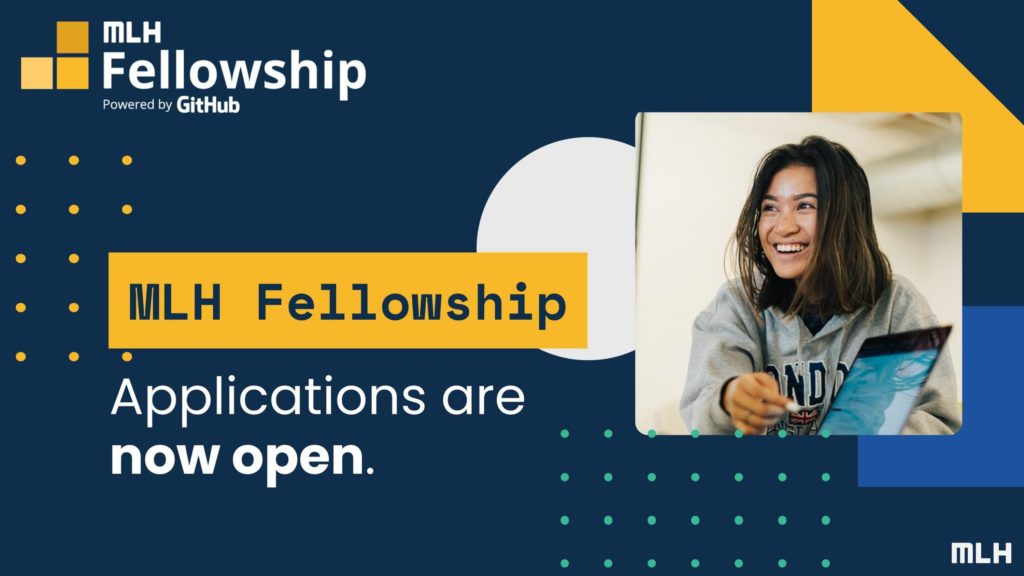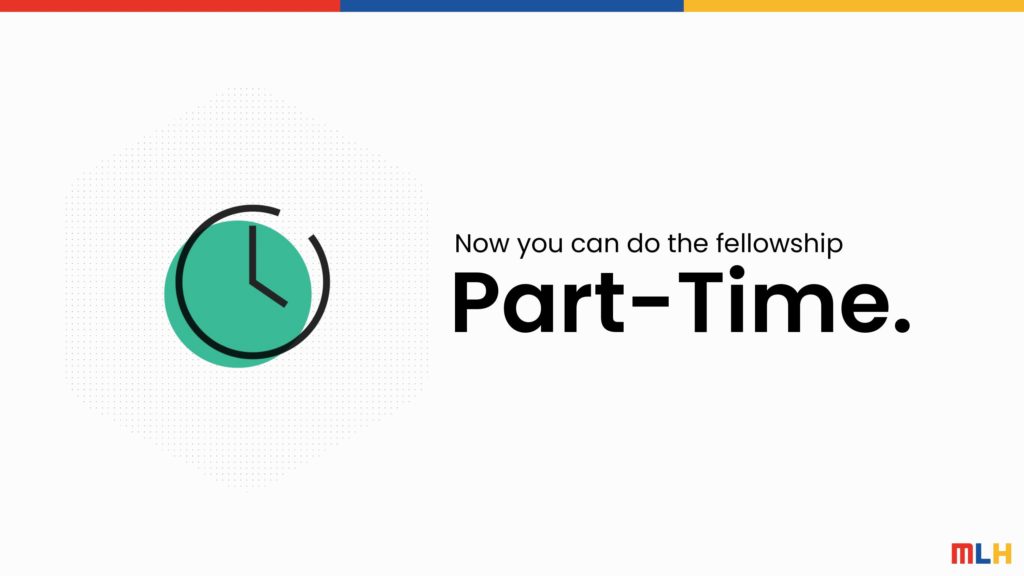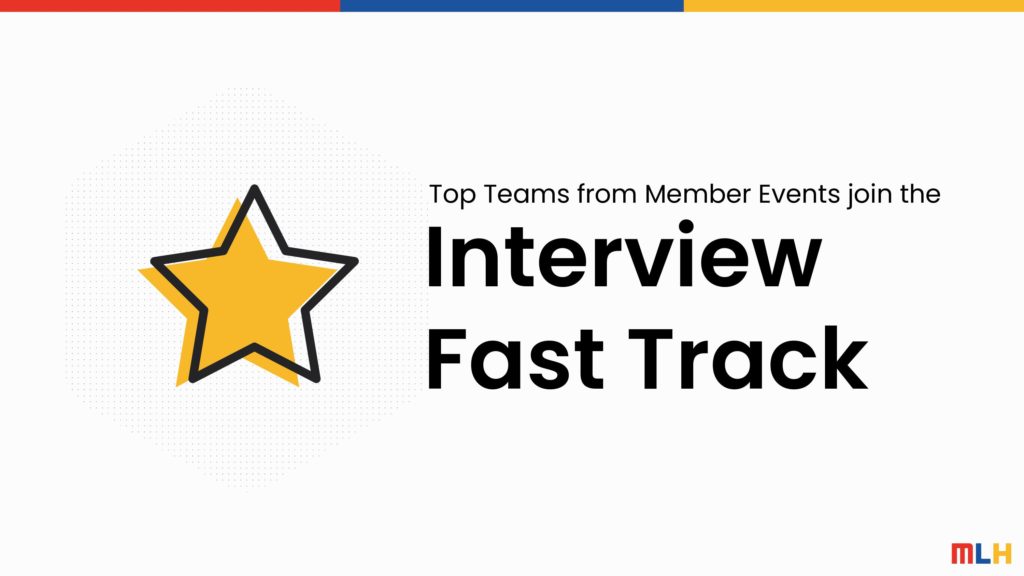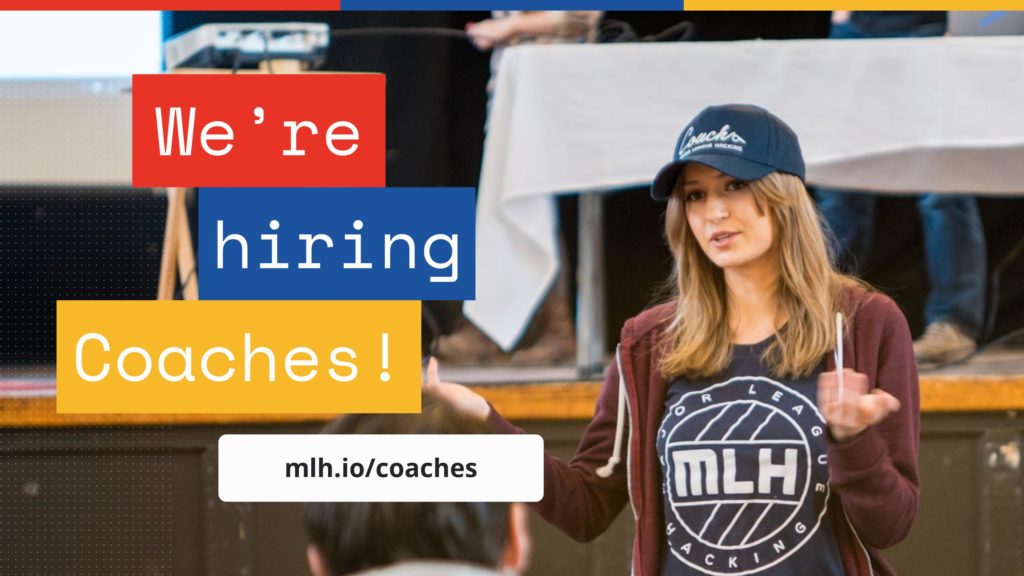As a Public Benefit Corporation, Major League Hacking (MLH) publishes an annual impact report called “The State of the League” where Swift, the CEO of MLH, reflects on the work that we did empowering hackers in the previous year. He presented this report during the Keynote at Hackcon and has adapted his slides into this epic post for your enjoyment!
For those of you who don’t know me yet, my name is Swift. I’ve been a member of the hacker community since the second-ever student hackathon, and I’m not exaggerating when I say joining it changed my life.
Since that day, almost a decade ago, I’ve made it my job to tell the world what it means to be a hacker, and enable anyone with the desire to become one. That’s why, seven years ago, I founded Major League Hacking. We’re a public benefit corporation, or B Corp, that has the same mission that all of you do.
That mission is to empower hackers, to inspire and equip our next generation of technologists, and help them build the skills and the network that they need to bring their ideas to life and tackle whatever challenges the world throws at them. Together, we’ve been extremely successful in the pursuit of this mission. But before I tell you about it, I want to start with a story. My story, actually.
Back when I was in high school, I was running a small landscaping business in my hometown. While my friends were all working in restaurants, I was running around with a lawnmower outside enjoying life.
Eventually, the time came for me to head off to university, and my parents pointed out that I was going to need a new job. (You can’t really bring a lawnmower to a dorm room, after all.) So I did what any enterprising, young high school student would do. I went on my school’s job board, sorted the jobs by how much they paid, and applied for every single job that paid the most, regardless of what it was.
A few days later, I got an email back from one of them, inviting me to come in and interview. There was a problem though. It was a programming job, and I had never programmed before in my life.
I thought, Surely there must be some kind of mistake. I mean, they must be better off hiring someone with literally any programming experience whatsoever. But thanks to the encouragement of my friends and family, I decided to take the interview. I told them that I was a hard worker and willing to learn, and they took a chance on me.
I spent the next two years writing accounting software – in PHP, of all things. It was a great job and I learned so much along the way. But I never really told anyone about it. Honestly, I was pretty embarrassed. I wanted to be a lawyer, not a programmer. Back then none of my friends were programmers. Startups weren’t really cool yet. And when people heard that you were a programmer, they immediately thought of Dilbert. So I kept my job to myself.
Fast forward a couple of years. I remember the day perfectly because it had just snowed, we had the day off of class, and me and my housemates were building an igloo in our backyard. But I had to leave to go finish a website I was working on for my job.
One of my housemates noticed, and said, “Hey, what happened to Swift?” My roommate had had enough of the secrecy and spilled the beans. “He’s in a room coding. That’s what he does for a job.” The observant housemate jumped up, came running to my room, burst in my door, and said, “Hey, I’m going to this thing tomorrow called a ‘hackathon’. You have to come with me.”
I had never heard of a hackathon before. It sounded like something that only elite programmers did, not a complete beginner, like me. But my friend swore up and down that I would have a great time, and I would be welcome. And luckily, I listened to him.
My first hackathon was hackNY at New York University back in the Fall of 2010. When I walked into that room, I discovered a community that blew me away. There were a hundred other university students who had given up their weekend to party in order to stay up all night, bring crazy ideas to life, and then show them off to a room full of complete strangers at the end. I’d never seen anything like it before!
I spent the next 24 hours trying to combine Facebook and Dropbox APIs. The idea was to make a file-sharing network for you and all of your friends. (A funny side note to this story is that I ended up locking myself out of my own project accidentally and I couldn’t even demo it. It was super embarrassing.)
When I got home after that hackathon, I was so exhausted after being up all night that I completely crashed. When I woke up, I looked at myself in the mirror and said, That was the best experience of my life. Forget being a lawyer. I want to be a hacker instead.
The next day, I switched my major to computer science. I started going to every hackathon I could get my hands on, and for the first time in my life, I felt like I had found a community where I belonged. I wanted to share that with everyone I knew.
Back when I got my start as a student hacker, we were lucky to get one hackathon every few months. And if you wanted something to do in between those hackathons, good luck! Today, I’m proud to say that things have changed.
Last year, the MLH community collectively hosted more than 1,200 events with our support – hackathons, workshops, meetups, conferences… You name it, we did it all! That represents a 20% increase in the number of opportunities that hackers had to join our community from last year.
In fact, more than 95,000 hackers attended those events. That’s 95,000 people whose lives changed! That includes people who could have been lawyers, but are probably hackers now. That’s the most hackers that MLH has ever reached in a year, and our entire community should be incredibly proud of this accomplishment.
But we didn’t just empower more hackers than ever, we empowered more diverse hackers than ever, too.
Last season, almost 40% of hackers identified as female or non-binary. That’s up 18% year over year from 2019, and significantly better than computer science enrollment, which is almost 80% male in the US, and often, worse than that globally.
That change didn’t happen overnight though. I still remember the first time we started community dialogue around improving gender diversity at all of our events. It was clear that we needed to do something. The question was what?
I’m proud to say that this change was the result of a lot of hard work from our huge network of community leaders. And today, I want to introduce you to a few of them. 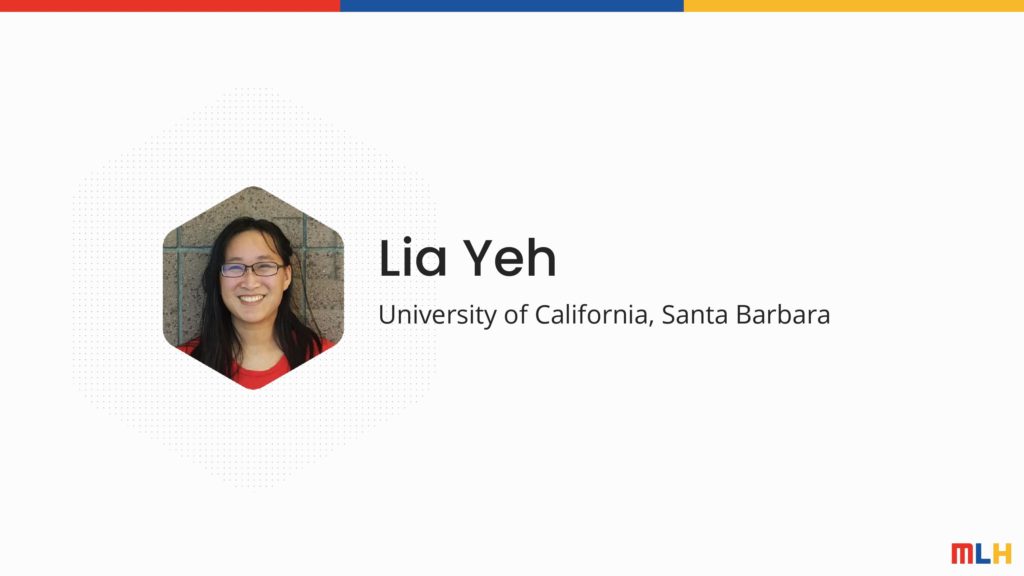
The first person I want you to meet is Lia. Lia was the only female attendee at her school’s Local Hack Day back in 2014. When she went off to university and told people that she wanted to be a quantum computer scientist, they just gave her funny looks. But luckily, none of that deterred Lia. Instead, she started teaching workshops to middle and high school girls. She hoped to make them feel welcome where she hadn’t. And this is where she met Sarina.
As a non-CS major who wanted to learn to code, Sarina felt that her options were limited. The resources out there weren’t exactly beginner-friendly, and they were riddled with underlying sexism. She had heard of hackathons before, but never felt welcome at one. When she met Lia, they decided to team up and try to change it.
Together, Lia and Sarina created Womxn/Hacks, a hackathon focused on making a welcoming space for female and non-gender conforming students. Together, they brought out nearly 200 aspiring technologists. And they did everything in their power to show them what a more inclusive tech world could look like.
Their work paid off. Lia said it was the first time she, and many of the attendees had ever heard a female software engineer share her story. Direct outreach, a focus on creating welcoming spaces, and elevating their community to positions of leadership helped change the perceptions of the Womxn/Hacks attendees.
But they weren’t alone in pursuing those strategies. Last season, MLH partnered with 16 hackathons focused on empowering underrepresented technologists. On top of that, gender diversity was a major point of focus for almost every single organizing team in our community. And together, we all made a difference. Thanks to these efforts, gender parity is in sight!
But gender isn’t the only diversity that matters. In other areas, the MLH community was not as successful as we could have – or should have – been. Take racial and ethnic diversity, for example. Last year, only 4% of our community identified as Black or African, and 7% identified as Latino.
While those numbers are in line with US computer science enrollment, it’s simply not good enough for us. It’s even more problematic when you consider the fact that MLH is a truly global community, with a presence in countries where people of color are the majority.
This is a multilayered issue with tons of systemic causes. But as we’ve seen with the changes our community has made towards gender equity, a united, self-reflective effort can make an impact, especially with movements like Black Lives Matter in the global spotlight right now. We have the opportunity and the momentum. We need to start a dialogue.
Major League Hacking is committed to being an anti-racist organization, and to educating and inspiring our community leaders to ensure that their events and communities are too. We’re working hard to assemble a kit of resources that we can share with the community to help them address the racial bias that’s endemic to hackathons – everything from who’s allowed to attend them to what’s happening during the events.
We’re also always on the lookout for ways to elevate diverse leaders in our community. Storytelling is a major medium we use for that at Major League Hacking. That’s why, earlier this year, we announced a new initiative called the MLH Top 50.
Our hope was that by highlighting some of the most diverse and inspiring stories from the last year, we could inspire future hackers and organizers too. I’m proud to say that more than 50% of the Top 50 identified as women or people of color. And our hope is that this group continues to be even more diverse in the future. We’ll be opening up nominations for the Class of 2021 this Fall.
How do we keep our community engaged remotely?
Now, making our community more diverse isn’t the only challenge we’re facing this year. Usually, at Hackcon, I get to tell everyone how things are bigger and better but still fundamentally the same. But the truth is, today, things couldn’t be more different.
Thanks to COVID-19, almost everything has changed. And I want to spend the rest of this essay focused on that. Specifically, I’m going to talk about how COVID has changed things for our community, and what we at MLH are doing to support our community through these uncertain times.
For starters, we all need to rethink how we engage our communities in the first place. It may come as a surprise to some of you, but our community has historically been one of the largest in-person developer communities in the world.
Going into the Fall, more than 70% of our hackers are unsure that they’ll attend an in-person event within the next year. And frankly, in areas where there’s still community transmission, we wouldn’t encourage anyone to attend an in-person event regardless of how they feel. On top of that, thousands of campuses are closing, going remote, and prohibiting public gatherings in the first place. So the possibility of in-person events this Fall, or really this year, is slim at best.
The next best thing we can do is take our communities online. But that has its own challenges. First and foremost is convincing hackers that online events are even worthwhile. Before the pandemic, less than 10% of hackers had ever participated in an online hackathon before. Another 20% had never participated in a virtual developer event of any kind.
On top of that, not everything from the in-person hacker experience translates well to virtual events. For instance, we all know how intimidating it can be to attend your first hackathon. Just imagine what that’s like when you’re attending it alone, from your own home. Dropping out is just a click away.
So how do you bring a sense of community to online events? How do you help hackers build a network and connections? How do we help keep attendees energized and engaged? These are all questions that the MLH Organizer community has set out to answer. One of the first events to try was organized by the person in my next story.
Meet Jacklyn. Jacklyn got her start at Hack the North back in 2018. She attended it on a whim, a few days after arriving in Canada for a study abroad. She quickly fell in love with our community. She started going to every hackathon she could get her hands on, and eventually, she became an MLH Coach, helping to support Organizers like you around the world.
Now, at the beginning of the COVID outbreak, Jacklyn found herself back in the UK. Classes were being canceled and in-person hackathons were quickly becoming infeasible. Jacklyn knew she had to do something to keep the hacker spirit alive. She brought together Organizers she had met from all around the world. Their goal was to plan the first natively virtual MLH hackathon, Hack Quarantine.
The team managed to organize the event in just 10 days! They brought together nearly 3,500 hackers and challenged them to create projects that help to fight the effect of COVID-19. Their work paved the way for hundreds of other Organizers in the MLH community, to plan their own digital events too.
Around that time, it quickly became apparent that virtual events were about to become the standard. After watching our first few organizing teams go through the transition, it became clear that they needed MLH’s help. There’s no playbook on how to organize a world-class virtual event and Organizers were struggling to figure out what to do.
The virtual hackathons that were out there, they’re nothing like our events. They spend multiple weeks or months on them, they’re extremely competitive, and they often revolve around a single sponsor’s technology. We knew there had to be a better way and the success of our community depended on us finding it – and fast.
So the MLH team set a goal: To organize a virtual hackathon every single weekend of the summer and codify everything we learned into a set of best practices that we could share with the community. And that’s exactly what we did.
Since then, our team has organized 16 hackathons in 16 weeks. The results were overwhelmingly positive. But don’t just take my word for it. Hear what some of the attendees had to say.
As you can see, we found something truly special here. In fact, hackers like these events so much that 35% of attendees plan to continue attending virtual hackathons, even once in-person events return.
One of our core values at Major League Hacking is Learn, Build, Share. It challenges us to take the things we’ve learned and turn them into resources that we can then share with others to improve our community and the world.
In that spirit, we took everything we’ve learned from organizing these events and we packaged them up just for you. We published a new section of our famous Hackathon Organizer Guide. It’s focused on planning a great virtual hackathon.
Now, for those of you who aren’t familiar with the Guide, it’s basically a book on how to organize a world-class hackathon from start to finish. And today, there’s a section specifically focused on virtual events that shares all of the best practices that we’ve learned from organizing all of those hackathons this summer.
But the guide can’t possibly cover every scenario imaginable. Sometimes you need advice that’s specific to you and your community. That’s why our team started organizing a new set of Virtual Peer Groups every single week. Our Virtual Peer Groups are focused on helping Organizers make the transition to virtual events seamlessly.
Have you ever been to a Peer Group before? It’s like getting to go to a mini Hackcon any week of the year. You hear directly from other Organizers in the community and work together to find solutions to the challenges that you’re all facing. It happens under the guidance of an expert from MLH who can share best practices and connect you with additional resources and community members.
In addition to supporting Organizers during the planning process, MLH is committed to continuing to support Organizers the day of the event at the standard of excellence we’re known for. Beyond all the great benefits you’ve come to expect from MLH at hackathons, like prizes, software credit, fun mini-events, and an experienced coach to support you, we’re rolling out a suite of new member benefits that are specifically designed for virtual events.
The first one is one that all Member Event Organizers will immediately have. They’ll have access to free enterprise-grade software to power their virtual events. You’ll have access to a Zoom account that you can use for your opening and closing ceremonies, workshops, mini-events, and everything in between.
On top of that, you’ll gain access to a powerful livestreaming tool called StreamYard. You can use it to broadcast your hackathon demos seamlessly to Twitch, YouTube, Facebook – wherever your community lives. You’ll also be able to stream your demos on the MLH Twitch Channel and YouTube channel in order to reach an even larger audience, bringing increased value to your hackers and sponsors.
We also know that swag is a major draw for attendees at hackathons. Swag enables our communities to showcase their identities as hackers. We don’t want them to lose that just because our events have gone virtual.
That’s why every attendee at official MLH hackathons will be getting a package in the mail. It has stickers, promo credit, and a personalized thank you note. Hackers love receiving these swag packs. We’ve seen so much love on social media from members of our community around the world.
Starting this Fall, they’ll have something else to be excited about too. I’d like to introduce you to your 2021 Season Mascot – Ellie the Electric Elephant. As many of you know, every season we design a new mascot that shows up on shirts, stickers, and so much more. You can expect to start seeing Ellie swag at all of your Fall events. We’ll be printing thousands of Ellie t-shirts and including them in the swag bundles we’re sending out to hackers.
With this new and powerful logistics network, we want to take it even a step further, which is why we decided to announce a new benefit for Member Events. Now you can tap directly into MLH’s logistics system to distribute your swag and stickers too.
All you have to do is get us the designs and our team will work with you on printing, shipping, and any troubleshooting that needs to happen. We’ve already started partnering with some of the larger hackathons this Fall to help them with this, and we hope even more Organizers take advantage of them too.
Additionally, now that we have this powerful logistics network, we can start using it to bring back some of the other benefits from in-person hackathons too.
One of the best parts of MLH hackathons is that all of the hardware devices that hackers need are at the event waiting for them. You can even show up without a laptop and have access to one.
I’m thrilled to announce that we’ve got a new pilot program we’ve been running this summer. Hackers can request MLH hardware for a hackathon and have a loaner device shipped directly to them – free of charge – during the event. We’ve already been doing this with Amazon Alexa in the United States and we plan to expand this program to additional devices and regions this Fall.
Finally, we all know that beginner focus workshops are critical for creating a welcoming space at your events and making them open to first-time hackathon attendees. That’s why we’ve expanded our MLH Localhost program to give every single member access to live, hands-on workshops every weekend.
Our team organizes these workshops, so you don’t need to worry about speakers or any of the logistics. All you need to do is add them to your schedule and we’ll take care of the rest. We offer workshops in every major regional timezone and cover a wide range of skills that hackers can immediately use in their projects.
Between the Organizer Guide, increased Peer Groups, and all of the new Member Event Benefits, we believe you’ll have a strong foundation to start planning your new virtual events. There’s still a lot to learn though, and the MLH Team will continue to create resources and launch new benefits that support all of you during this transition.
What does it mean to have a “local” community in a remote world?
Now, COVID hasn’t just changed how we engage our communities. It’s also shifted and eliminated the boundaries that define our communities in the first place.
What’s the purpose of a local hacker club when more than 20% of your members aren’t planning to return to campus? And what does it mean for those who are, when they’re not allowed to gather in-person anyway? What does it even mean to be a regional hackathon when you can now accept attendees from literally anywhere in the world? And when hackers have 10 online hackathons to choose from, how do we differentiate ourselves?
These are big and totally valid. questions. I believe that communities will become even more fluid than they have ever been before. If we want to preserve and protect our communities, we need to focus on the fundamentals.
I’ve always said that the strongest communities gather regularly. That’s because communities are about creating spaces where the members feel like they belong. The more often you gather, the more connections you make, and the stronger the community becomes. Now we’ve seen this play out over and over again in-person. Take Nigel Brown, for example.
Nigel saw that access was a huge problem for many of his classmates. It was so taxing for students to keep up with their coursework while applying for – and traveling off to – hackathons all over the world. There wasn’t really a shared sense of community locally.
With the help of a few of his friends, Nigel started a club at their school and got to work planning events. They planned a Local Hack Day, brought in speakers from their network, and ran tech meetups. As a result, Nigel’s community grew strong. He was able to share his experience at Hackcon and became a GitHub Campus Expert, helping to build global communities even further.
The network he was able to build through MLH ultimately helped him land a job at IBM, where he continues to support communities to this day.
“The skills & network I gained through MLH helped me land a great job at IBM.” – Nigel
But what would have happened to Nigel’s community if he had to start it during the pandemic?
Frankly, one of the biggest risks of COVID is that our communities fragment because they’re physically spread across the globe and unable to gather. If we want to prevent that, we need to create regular virtual meeting places and inspire a collective sense of identity. Luckily, MLH has a few things in store to help you with that this season.
First off, in addition to all the MLH Localhost workshops that you’ll have access to at your hackathons, we’ve also committed to organizing events during the week for clubs to attend.
We’re hosting more than 10 workshops per week now. And they take place in every regional timezone. You can use these as your regular club activities, without all the hassle of lining up speakers or dealing with logistics. And when you are ready to organize your own events, we’ve made that easier than ever.
Meet Organizer HQ – the software platform that MLH built that helped Organizers plan more than 2,000 events so far. It streamlines the planning process by guiding you through it step-by-step and making it easy to request help from MLH whenever you need it. And once your event is approved, it turns into a powerful event planning tool that you can use to manage attendees, event resources, and even the public website for the event.
Every event comes with one of these pages, no coding required. It’s all customizable, and you can even ask attendees custom questions at registration and manage and export it all for your dashboard.
We aren’t the only ones excited about Organizer HQ. Today, I’m excited to announce a brand new partnership that will help inspire your communities to contribute to open source. This October, we’re teaming up with our friends at DigitalOcean for Hacktoberfest – a month-long celebration of open source.
Open Source is something that hackers care about deeply, something they want to get more involved in. Did you know that 60% of hackers say that they’re interested in open source but don’t know how to get started or feel like they just aren’t skilled enough yet? Whether you’re a new developer or a long-time contributor, Hacktoberfest events are a great place to gather with other Open Source enthusiasts.
All of these virtual meetups will be a great place for hackers to come to actually get started contributing. And it’s all being powered by MLH on OrganizerHQ. We’ll make it easy for community leaders around the world to introduce their hackers to open source. And we hope to see many of our community leaders using Hacktoberfest as one of the gathering points for their communities this Fall.
But that’s not all we have for you. In addition to Hacktoberfest events, the entire MLH Localhost library is available on OrganizerHQ for you to organize starting today.
This Fall, we’re also starting to open up the platform for hackathon Organizers too. If you’re interested in getting involved with the beta, reach out to your Community Manager to let us know.
Finally, I’m excited to announce that one of the most important gathering points for our community and the MLH network is back – Local Hack Day. Local Hack Day is a worldwide celebration of learning, building, and sharing. We empowered Organizers around the world to bring together their communities three times last year, each with a slightly different format.
In the Fall, there’s Local Hack Day: Learn. It’s a day-long conference designed to teach hackers new technical skills. In the winter, there’s Local Hack Day: Build. This is a 12-hour hackathon where hackers put those skills into practice. And in spring, Local Hack Day: Share. This is a demo and finish-up-athon designed to help hackers polish up the things they’ve been working on all year for their portfolios. They’ll all be back again this year and we can’t wait to see how you use them.
Last year, more than 17,000 hackers attended Local Hack Days organized by you, hundreds of events all around the world that brought together your local communities. And it helped them grow strong. This represents 50% growth from last year, which is a testament to how important these events are to our communities.
But there’s a problem. Organizing a local event for Local Hack Day sort of defeats the purpose when everything can be done virtually. We’re changing things up this year.
Instead of asking Organizers to plan their own Local Hack Days and to create their own locations, our team will be putting together a huge roster of activities for every one of the Local Hack Days that anyone in the world can attend. Community leaders like you can register your community as an official group.
As your hackers attend and participate in Local Hack Day activities, they’ll earn points on a global, public leaderboard. And at the end of the event, you’ll be able to redeem those points for benefits and swag that you can distribute to all of the members of your community. Local Hack Day: Learn is coming up this October and registration is open right now. We can’t wait to see what your communities think of these new events.
Between Localhost workshops, access to OrganizerHQ, Hacktoberfest, and Local Hack Day, we think you’ll have everything you need to keep your communities strong by bringing them together regularly.
What does COVID mean for our next generation of technologists?
Finally, I want to talk about an issue that’s front and center for all of our community members. It’s not just the future of our communities themselves that are at risk, hackers are also worried about their own futures – especially their careers.
More than 45,000 hackers in our community missed out on jobs and internships that they were counting on this summer. They were counting on those jobs to learn the skills that you don’t learn in a classroom – skills they need to launch their careers and skills that employers expect them to have. Today, more than 40% of hackers believe that they will be underprepared to enter the industry as a result of COVID-19, and that number is only rising. This is a huge issue and we knew we needed to do something about it.
That’s why we teamed up with our friends at GitHub to launch the MLH Fellowship this summer.
It was a 12-week internship alternative for aspiring software engineers. Instead of interning at a single company, we helped students learn the skills they needed by contributing to Open Source software that’s used by thousands of companies around the world.
Clearly, this program struck a chord with hackers. In just three weeks, we received more than 20,000 applications for the program. And thanks to the support of our partners, we were able to support a class of 150 of them in our first batch this summer.
Students contributed to major open source projects, like React, Homebrew, and Flask. They had the support of a full-time expert mentor who helped them learn best practices of open source and level up. And I’m proud to say that the first class was a huge success. The Fellows did level up, more than anyone could have expected. But don’t take my word for it.
Meet Prosper, an MLH Fellow from Nigeria. He learned to code on an Android phone because he didn’t have a computer. Through a lot of hard work and determination, Prosper taught himself the basics, but he quickly reached the limit of what he could do on his own.
That’s why he joined communities like the Facebook Developer Circles community, where he was exposed to a network of other enthusiastic engineers and community leaders. Prosper won a scholarship from Facebook Developer Circles to participate in the MLH Fellowship this summer. He said his experience in the Fellowship was a game changer.
“Joining the Fellowship was a game changer for me. The skills I learned helped me launch my career & land my first full-time job as a Software Engineer.” – Prosper
He was able to experience what it was like to collaborate on a team with standups retrospectives and a dedicated mentor. The skills that Prosper learned, they paid off. He just landed his first full-time job as a Software Engineer as a result.
After the success of this first Fellowship class, and seeing the demand from hackers, we knew we had to do it again. That’s why we’re excited to share that the MLH Fellowship is back this Fall, and will be run as a continuous program, three times per year.
In fact, applications for the Fall, Summer, and Spring batches are all open right now. In the last two weeks since we opened applications, we’ve already received more than 5,000, and that number is climbing every minute.
To help ensure that we’re able to empower as many hackers as possible, and help them get the most out of the program, we’re making some changes that I’m very excited about.
First, starting this Fall, we’ll be offering a second fellowship program. In addition to the classic Open Source fellowship, where hackers level up by contributing to major open source projects, we now have the Explorer Fellowship as well.
Explorer Fellows will spend 12 weeks filling out their portfolio by collaborating with other Fellows on a series of two week-long, hackathon-like sprints. We’ll be bringing in expert speakers and founders from startups in the industry to help expose Fellows to a wide range of topics, and they’ll most likely have access to opportunities that will be unbelievable.
Next, we’ll be offering a part-time option to help accommodate Fellows with diverse scheduling needs.
Not everyone has the ability to dedicate 40 hours per week to open source, current students included since, presumably, you all have classes to go to. The part-time option allows Fellows to participate by contributing 10 and 20 hours per week. Both the Open Source and Explorer programs have part-time offerings, in addition to the standard full-time offering of the Open Source program.
We’ve also made some changes to how we handle scholarships and stipends. Previously we offered a stipend to every Fellow, regardless of their circumstances. This caused some Fellows to receive a stipend that they didn’t need, while others who did weren’t getting enough to make a difference. Going forward, we’ll be offering stipends on a need-basis, which means we’ll be able to allocate them to the Fellows who actually require them to participate in the Fellowship. We think this strategy is key for creating a diverse Fellowship class that spans the globe.
Finally, we know a major reason that hackers go to hackathons is to level up, so we want to give our organizers a new way to help them do just that.
Starting this Fall, organizers will be able to offer the Top Teams at Member Event hackathons fast-track codes to interview for the Fellowship. Regardless of whether they get in or decide to join the Fellowship, they’re going to get tailored feedback that they can incorporate into their resume and interview process right away. And for those who do join the Fellowship, we know it will be an experience like nothing they’ve ever done before.
Between new Fellowship options, flexible part-time scheduling, stipends to help those who need them, and fast-track prizes for your top hackathon teams, we hope you’re as excited for the Fall class as we are.
Our hope is to expand this program substantially over the coming year to accommodate as many Fellows as possible. It’s our dream to make the MLH Fellowship the go-to place to launch your tech career, a place where hackers can always come to learn the skills that they need to succeed, wherever life takes them.
We’re still with you, every step of the way.
So, yes, COVID has changed everything. We have to rethink how we empower our communities, what defines those communities in the first place, and how we can help our community members achieve their most important goals. We know it’s scary, but the team at Major League Hacking will be there with you every step of the way. That’s because our mission is to empower hackers. It’s the reason we do what we do every single day. And it’s the same mission that drives the organizers in our community too.
If you’re an organizer looking for ways to further pursue that mission, I have one specifically for you.
You’ve heard me mention MLH Coaches a few times, but what exactly are they? Coaches are like hacker superheroes, without the capes and masks. They’re expert community members who received tons of training from MLH. Their job is to make sure that hackers, Organizers, and sponsors all have a great experience at MLH hackathons, workshops, our Fellowships, and everywhere that MLH pursues its mission.
They can be found doing everything from debugging code in the middle of the night to ensuring that event judging goes smoothly. They even take out the trash at in-person events sometimes. No job is too big or too small for an MLH Coach. It’s a paid, part-time role that’s perfect for students and recent graduates, and we’re hiring everywhere. Applications are open right now.
It’s Coaches that have made almost all of the exciting announcements I have shared with you possible in the first place, and I hope that many of you will apply to become Coaches this season as well.
With that, I want to thank and congratulate our entire community for another amazing year behind us. I look forward to seeing what we accomplish together in the year ahead and am more confident than ever, despite the uncertainty.
I’m Swift. I’m the CEO and co-founder of Major League Hacking. It is my privilege to serve you and this community every single day.
Thank you, everyone, and happy hacking.
